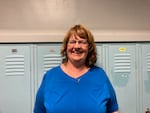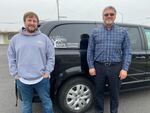
The Conde McCullough Memorial Bridge crosses Coos Bay, where housing, homelessness and substance abuse are just a few of the interconnected issues affecting residents of the coastal community.
Devan Schwartz / OPB
Housing
Coos Bay is expected to grow by more than 1,300 residents in the next five years according to a housing study that assessed the needs of the community. The study also found that the most pressing need is for affordable housing in Coos Bay.
Drew Farmer is a member of the Coos Bay City Council. He says the community is missing about 77 units to ease the city’s housing shortage.
He believes that there is a shortage of affordable homes to rent because renters who have the means to purchase or rent higher-priced units are choosing to stay where they are.
“We’re by and large missing the middle block,” he said. “That is an issue when you look at the pressures on the market.”
Farmer also thinks the community will need around 600 housing units to accommodate the expected growth.
The City Council has passed some ordinances to try to address the housing shortage the community is seeing, but what concerns Farmer the most was a decision made this year to increase the number of short-term rentals from 45 to 75 units within city limits.
Farmer said he was opposed to this increase because of what is already happening in other communities, like Lincoln City, where a third of the housing stock has turned into short-term rentals.
“If we don’t have room to house our own citizens here permanently living here, it doesn’t make sense, to me, to push this,” he said.

Tara Johnson is the executive director of the Devereux Center, a homeless shelter in Coos Bay.
Sage Van Wing / OPB
Homelessness
As the nationwide eviction moratorium is soon set to end, the Devereux Center, a local Coos Bay shelter, is preparing for the worst.
“Now is about D-day,” Tara Johnson, executive director for the center, said.
Johnson estimates that there are about 800 to 1,500 people experiencing homelessness in the Coos Bay and North Bend area.
Right now she is seeing an increase in people over the age of 55, which she attributes to generational poverty that makes families unable to care for elderly relatives. She has also observed that some within this aging population suffer from health conditions that they can’t manage on their own, leading them to turn to the shelter for support.
Some of the clients served by the shelters are experiencing severe mental health struggles which Johnson says need state resources to help them manage.
“The state mental hospital, in all honesty, has failed our community,” she said.
Johnson says because the state hospital is only taking in new patients through the criminal justice system and the psychiatric unit at the nearby hospital, Bay Area Health, is at capacity, many of her clients can’t get the help they need.
“We’re not equipped to handle somebody who has moderate to acute mental health issues,” she said. “There is nothing here. Nothing. So then they just live on the streets.”
Johnson also said that many of the senior citizens served at Devereux Center receive around $800 in monthly assistance payments, which is not enough to pay for rent, given the lack of affordable housing in Coos Bay. In addition, the waitlist for Section 8 federally subsidized housing in the area can take up to two years.

Bay Area First Step is just one of five behavioral health resource network facilities in the county that will be receiving a share of Measure 110 grant funding. The extra resources has allowed them to purchase a building to increase the housing they can provide, as well as run their facility 24 hours a day, seven days a week.
Nalin Silva / OPB
Measure 110
Bay Area First Step, a peer-run addiction treatment center in Coos Bay, is one of five facilities approved to receive funds for substance abuse recovery through Measure 110′s behavioral health resource network.
The center was awarded $2.5 million, with the majority of those funds being used to purchase a building to provide more housing to clients struggling with homelessness and substance abuse.
Devin Bailey-Wilson is the lead peer mentor at the facility. He says when someone is unhoused, it provides a lot more challenges to provide treatment.
“They have to move their camps around, their tents around, and you get comfortable moving,” he said. “We can go out, look for this person, not see them and then another day, weeks later, we can (see them).”
The Measure 110 funding will also be used to allow the facility to run 24 hours a day, seven days a week, compared to operating only on weekdays from 9 to 5.
Steve Sanden is the Executive Director of BFAS. He says running around the clock means access to care will always be available.
“We know there’s a need to provide services when people want those services, not when we decide to get to work,” he said.
Sanden says that funding is hard to come by for substance abuse recovery providers, and is grateful for the state funds. He understands the concerns that some people have about Measure 110 around homelessness and crime but points out these concerns were around 20 years ago when he embarked on a path of sobriety.
He also asks for patience.
“We haven’t had time for folks to see the effects and I’d really like the community and the state citizens to give this thing a chance,” he said. “We can make a big difference.”



